“Heneral Luna,” “Gomburza,” and “Maria Clara at Ibarra” are just some of the historical (or history-adjacent) material we’ve seen enjoy phenomenal—even viral—success in recent years. But beyond film and TV, we’ve also long enjoyed these stories on stage, which in recent years include steampunk musical “Mabining Mandirigma,” the musical adaptation of “Dekada ‘70,” zarsuela parody “Walang Aray,” and theatrical explorations on historical what-ifs in “Kumprontasyon.” The latest challenger in presenting history through art and entertainment is Tanghalang Pilipino’s “Pingkian: Isang Musikal.”
Tanghalang Pilipino is no stranger to tackling historical material, and the same care and creativity they’ve poured into previous productions can be found in this new original work about the Katipunan’s youngest general.
Written by Palanca Award-winning playwright Juan Ekis and set to music by Gawad Buhay-winning composer Ejay Yatco, the musical delves into the mind and writings of an oft-forgotten revolutionary hero: Emilio Jacinto.
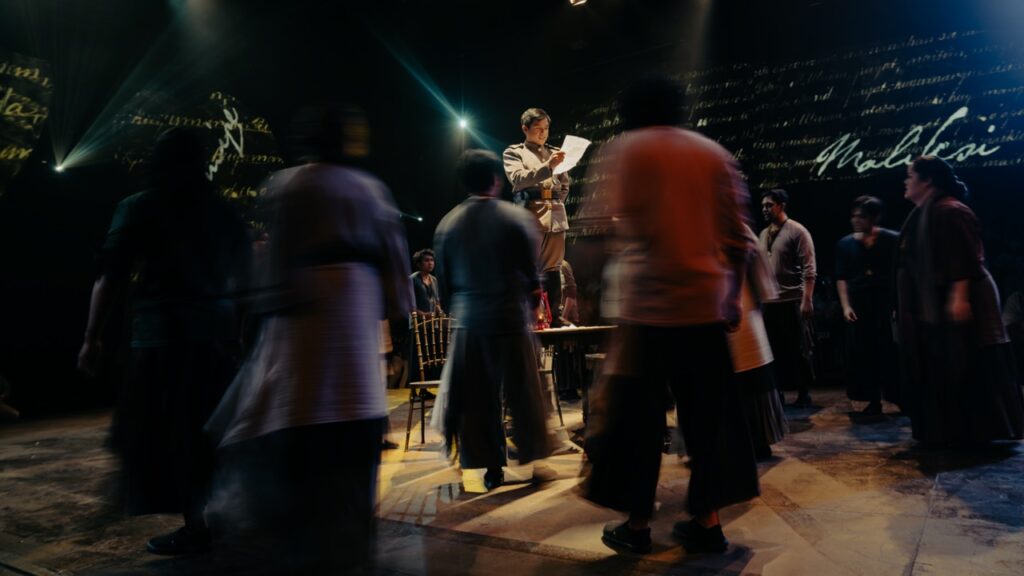
Jacinto, whose alias was Pingkian (meaning flint or tinder used to spark a flame), is best known for being the brains of the Katipunan. He was a writer, and established the Katipunan’s newsletter called “Ang Kalayaan.” But his most significant work was the Kartilya, which became the guide for the Katipunan’s new recruits. He was also the youngest of the Katipunan’s leaders, being general at only 17.
His writings became the inspiration for the form of the musical. Ekis notes that Jacinto himself made a lot of allusions to light and darkness in his writing, which is why these are key motifs throughout the two-act production. Each act is respectively called “dilim” and “liwanag,” and one of the songs is also literally called “Liwanag at Dilim.”
The hero’s words also appear in several songs. In the dynamic company number “Ang Kartilya,” words from the Kartilya itself are embedded in the lyrics. Here, Jacinto (Vic Robinson), Andres Bonifacio (Paw Castillo), and the members of the Katipunan read, recite, and repeat the principles outlined therein, as the words flash along the walls of the theater. The company emphatically sings—no, spits bars—on the aspirations and values of the Katipunan. (An effective bop, which “Hamilton” has already long proven.)
More than the rap, which aptly captures the spirit of the revolution and maximizes Jacinto’s words, the genre(s) used throughout the musical also reflect the emotions and conflict throughout the story. “Pingkian” is infused with rock-heavy tunes, sprinkled with rap, making it sonically young—a reflection of the story’s central character, as well as the very “youth” of the revolutionary organization as well.
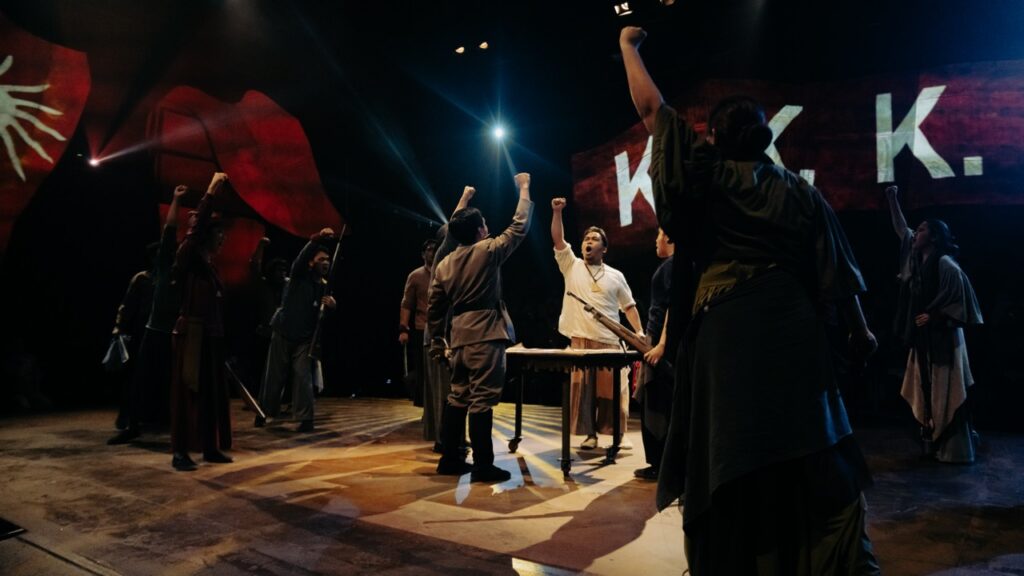
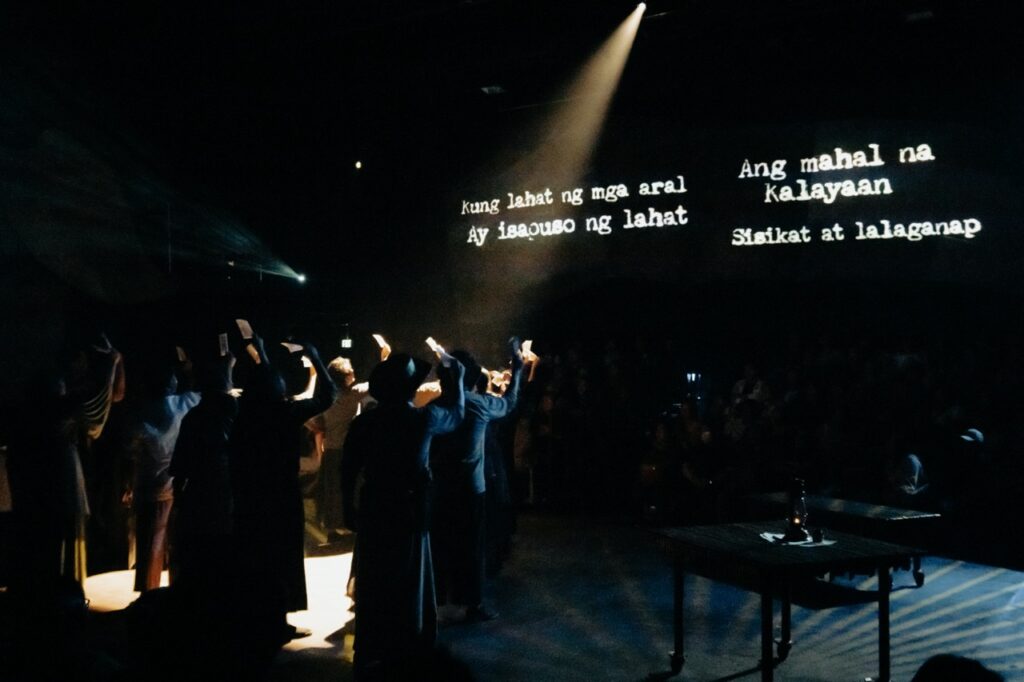
From instrumentation to the entire company’s vocal mix, “Pingkian” has the music down pat. But aside from this, the production also makes interesting choices in storytelling. Most of it is straightforward (well, straightforward in reverse) as it starts near the end of Jacinto’s life, where he is wounded and captured in the battle at Majayjay, Laguna, and works its way back. It is interspersed with dreams and hallucinations, as the ailing Jacinto falls into a state of delirium, seeing friends, loved ones, comrades, and other important figures in his reverie.
These hallucinations mix with flashbacks of key moments in the establishment of the Katipunan as well as Jacinto’s life. He is faced with ghosts of the past, some who serve to comfort him and remind him of what he is fighting for—in the case of Bonifacio, Rizal (Kakki Teodoro), and his mother Josefa Dizon (Bituin Escalante)—and some who haunt his memory for the faults of the Katipunan that Jacinto has taken upon himself as a burden to carry, as in the executed spy Florencio Reyes (Gab Pangilinan).
Even though most figures in our written history have been male, women have also been significant in this story. And will continue to be significant in the shaping of history-in-the-making, too.
Pangilinan plays both boon and bane of Jacinto’s consciousness—liwanang at dilim, in the form of Catalina De Jesus and Reyes, respectively. Reyes, the spy, looms as a strong, haunting memory, while Catalina is the ray of hope. To see these two contrasting sides personified by a single actor further emphasizes the weight both sides have on the young hero.
Pangilinan captures the spite and cunning of Reyes, making a strong presence in her song numbers as the spy. It’s markedly more impactful than the scenes as Catalina, but it is also through these recollections-slash-dreams of Catalina that we get a sense of lightness to the show, especially thanks to their sweet duet of “Ikaw ang Liwanag.”
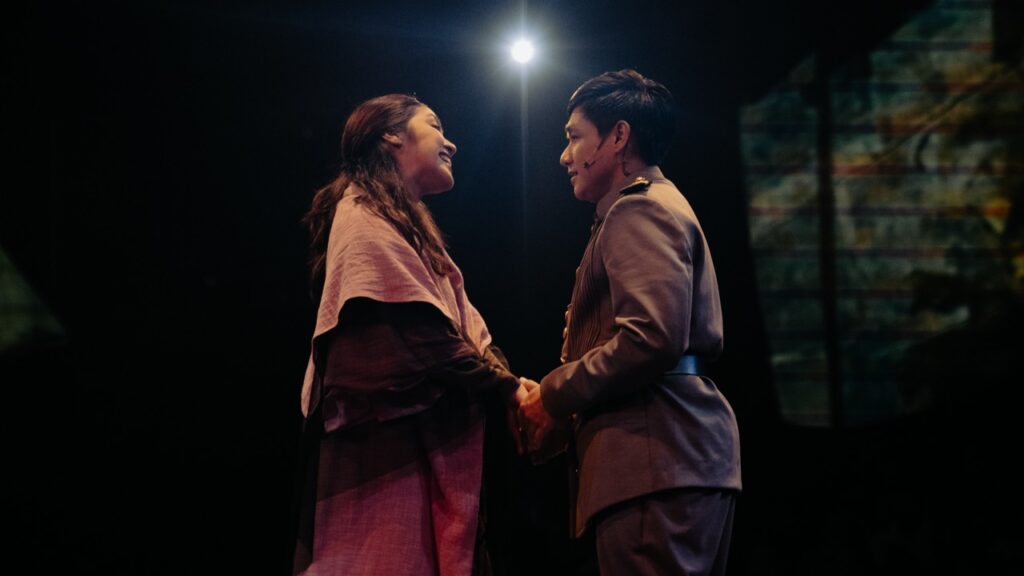
The reprise of the young couple’s duet, which includes their future daughter Laya (Jam Binay) starts hopeful and heartwarming. The scene is more moving as the trio reaches the song’s climax, where we see the love depicted in the song extend further than just the romantic. It grounds Jacinto—that aside from the seemingly lofty dream of the nation’s independence, we see here that he also really just wants to see a bright future for his family.
Robinson is also especially impressive in his performance as Pingkian. He definitely shines more in the somber scenes, where he is required a firm stance. We get to appreciate most of his verve in the numbers relating to the Katipunan. One of his most noteworthy performances is the Act 1 finale, “Ang Kasalanan ni Cain,” based on an essay Jacinto wrote. Here, Jacinto bellows and laments over the betrayal of several members of the Katipunan—foremost of whom was Florencio Reyes. At the end of the number, he delivers Reyes’ sentence with his own hand: death. Black out. Rousing applause.
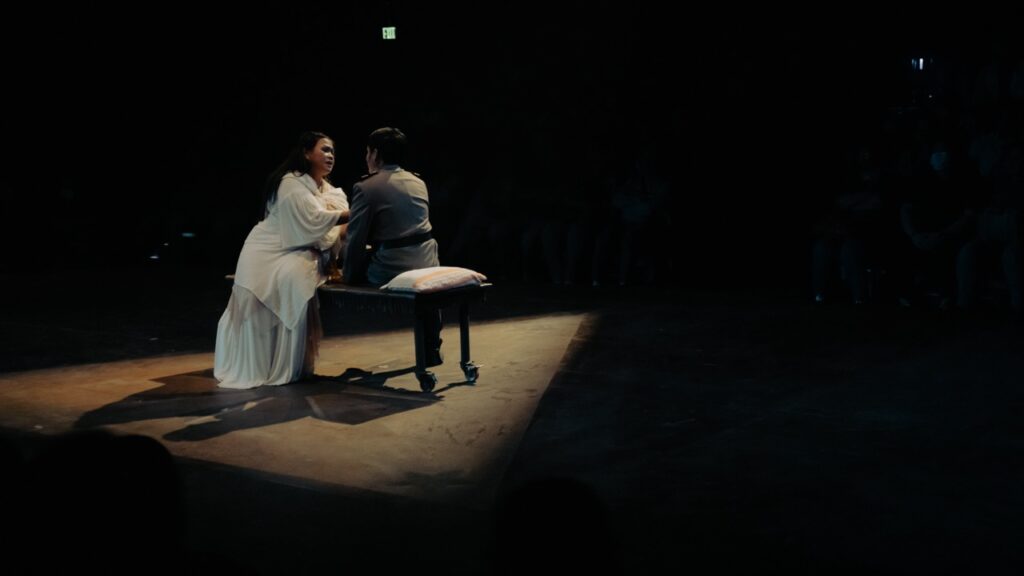
Other heartrending moments in the musical include Escalante’s solo as Josefa Dizon. Faced with Jacinto’s question of whether he had wasted his life fighting for freedom at such a young age, only to be met with so much hardship, the mother reassures her son. The quiet and tender moment between Escalante and Robinson may resonate with many youths—especially those who seek approval as warm and full as that of Josefa’s.
But one of the most striking choices in the musical is the gender-blind casting for another significant hero in our history: Jose Rizal. Casting Rizal as a woman makes audiences think, “why a woman?” But at the same time, “why not a woman?!” (Happy Women’s Month to us!) The goal, Teodoro and director Jenny Jamora share, is to draw the focus to the ideas Rizal represents, rather than strictly just the figure of Rizal.
Rizal—and even the inclusion of several women in the ensemble playing members of the Katipunan—opens our minds to the idea that even though most figures in our written history have been male, women have also been significant in this story. And will continue to be significant in the shaping of history-in-the-making, too.
Noteworthy staging
“Pingkian” is staged in the round, with audiences surrounding Jacinto and his troops on all sides. This has its pros and cons. It offers audiences different points of view, allowing one to focus on different aspects of the story as it plays out. On the other hand, some moments may see a key character favoring one side of the theater over the other. In this regard, one of the blockings I most appreciated was Jacinto and Rizal’s conversation when the former was attempting to sneak the latter out of exile: The two heroes converse over a game of chess. As the game progresses, they rally their points for and against Rizal escaping prison, for and against the armed revolution, each argument accented by either one capturing the other’s pieces. The two circle the stage, allowing audiences to see both sides of the match.
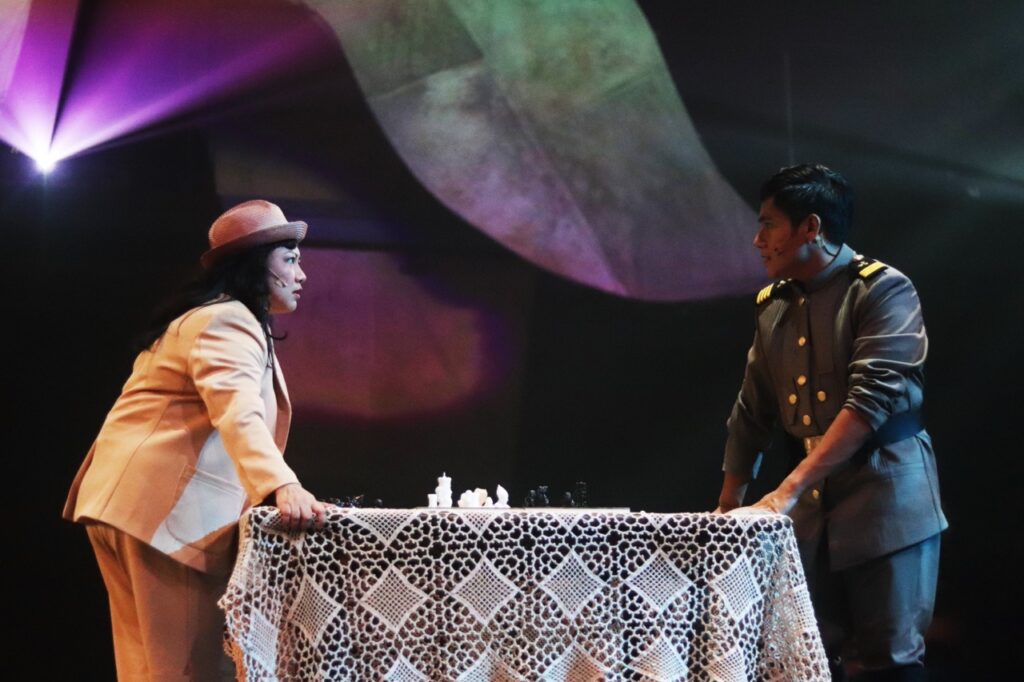
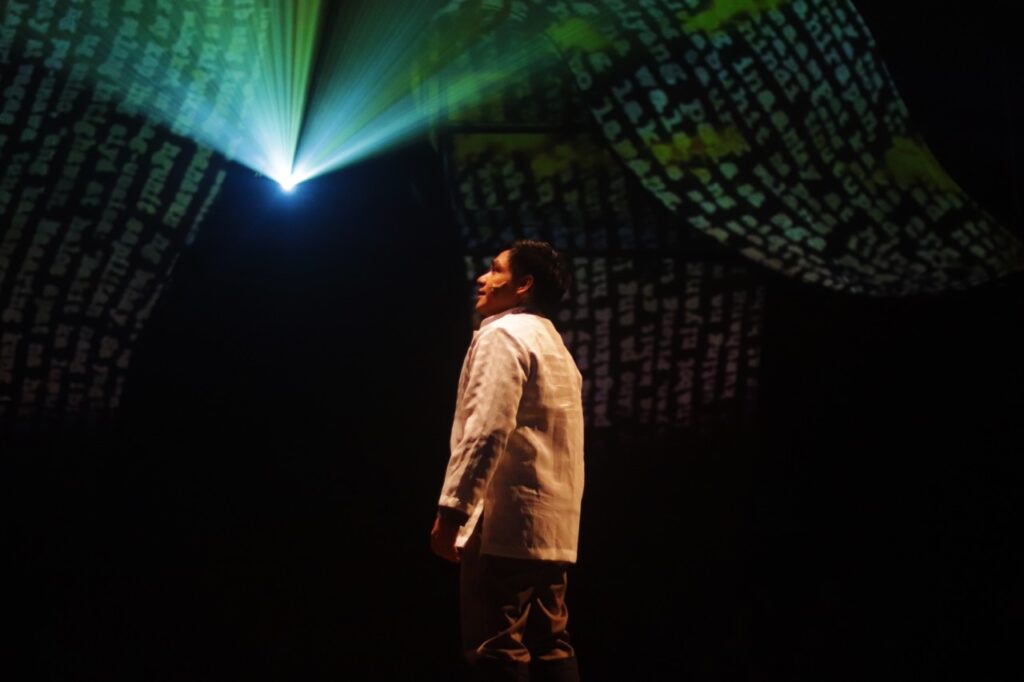
Jacinto’s words are also projected across the theater’s walls throughout the show, emphasizing not only the points of his writings but the message of the musical itself. While it does, at times, split your attention on whether to look at the projections and read his words, or watch the cast on stage, when the theater is filled with Jacinto’s words, we get an overwhelming sense of just how much this oft-forgotten hero has done. On a personal note, Jacinto becomes ultimately relatable when he asks—and he asks this a lot—if his words have any meaning. If words are enough at all to influence people. From one writer to another, the question hits close to home.
But what “Pingkian: Isang Musikal” proves and emphasizes, even after it ends with Jacinto’s death, is that for any change (or revolution) to begin, it must start within. Like many successful historical performance pieces, “Pingkian” succeeds in sparking hopeful ideas about the country, hope that it is still worth fighting for, despite it all.
Tanghalang Pilipino’s “Pingkian: Isang Musikal” runs until March 24 at the Tanghalang Ignacio Gimenez (Cultural Center of the Philippines Black Box Theater). Written by Juan Ekis, directed by Jenny Jamora, with musical direction by Ejay Yatco, choreography by Jomelle Era, production design by Carlo Pagunaling, projection design by GA Fallarme, lights design by D Cortezano, sound design by TJ Ramos. Starring Vic Robinson, Gab Pangilinan, Bituin Escalante, Kakki Teodoro, Paw Castillo, Almond Bolante, Joshua Cadeliña, Chan Rabutazo, VJ Cortel, Roby Malubay, Jude Hinumdum, Paula Paguio, Roxy Aldiosa, Jam Binay, Laui Guico, EJ Pepito, Jonathan Tadioan, Marco Viaña, Lhorvie Nuevo-Tadioan, Mark Lorenz, Sarah Monay, Edrick Alcontado.












































